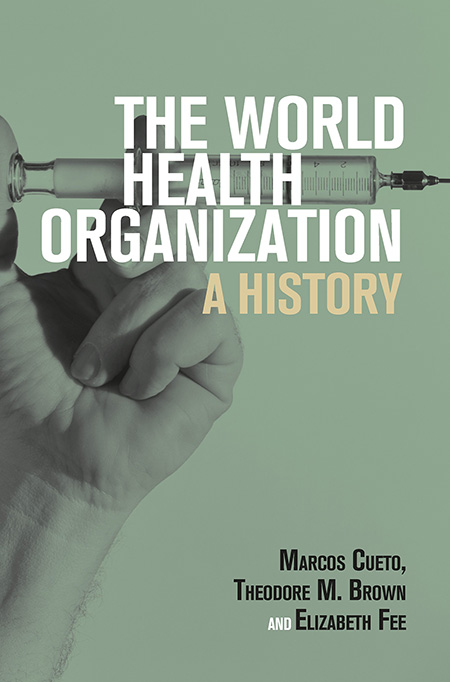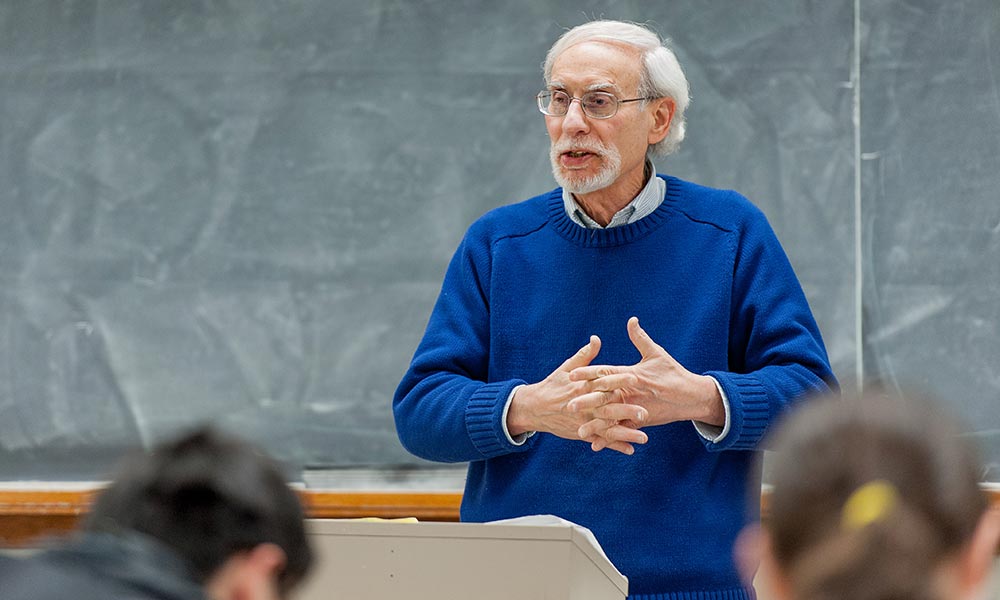Theodore Brown, a University of Rochester professor emeritus of history and public health sciences, is the recipient of this year’s Genevieve Miller Lifetime Achievement Award from the American Association for the History of Medicine (AAHM).
Over the course of a long and distinguished career, Brown has been “a major contributor to the historical understanding of US health policy and politics, as well as the history of both US and international public health,” says John Harley Warner, the Avalon Professor of the History of Medicine at Yale University and a member of the AAHM’s Lifetime Achievement Award committee.
First established in 1988, the lifetime award is given annually to a member of the association who has retired from regular institutional practice with a distinguished record of support for the history of medicine, and who has continued to make important scholarly contributions.
Brown’s research interests run the gamut from US health policy and politics, to the history of psychosomatic medicine, stress research, and biopsychosocial approaches to clinical practice. Prior to his retirement in 2018, he had been the University’s inaugural Charles E. and Dale L. Phelps Professor of Public Health and Policy, a position he held for five years.
His articles and coauthored books, among them Making Medical History: The Life and Times of Henry E. Sigerist (Johns Hopkins University Press, 1997), Comrades in Health: US Health Internationalists, Abroad and at Home (Rutgers University Press, 2013), and a comprehensive history of the World Health Organization published in 2019 by Cambridge University Press— along with his “critical labor” in editing the Rochester Studies in the History of Medicine book series and a regular historical section for the American Journal of Public Health—“have advanced the cutting edge of medical historical scholarship and shaped the work of other historians,” says Warner. “Through his scholarship, mentorship, and leadership in organizations such as the Sigerist Circle of the American Association for the History of Medicine, he has been particularly instrumental in infusing issues of health activism, health disparities, and the American health left into the fabric of the mainstream history of medicine and public health.”
Gloria Culver, dean of the University’s School of Arts & Sciences, hails Brown for his leadership and collegiality. “He is a wonderful scholar and his impact on the field will be felt for years to come. My first thoughts when I heard the news was that this is not surprising—it’s so very well deserved. Ted is a leader and an amazing colleague.”
Among the books Brown has authored or coauthored is the whimsical The Quest for Health Care Reform: A Satirical History, published by the American Public Health Association in 2012.
A history of health care reform through political cartoons

WATCH: Theodore Brown on the role of political cartoons in shaping the US debate over health care reform.
Through more than 200 political cartoons, the book tells the story of a century of wrangling over national health policy—from Theodore Roosevelt’s support for protection from the “hazards of sickness” in 1912 to the Supreme Court’s decision to uphold the Affordable Care Act in 2012.
“Political cartoons cut to the essence of our battle over who should foot the bill for medical coverage and how that care should be structured,” explained Brown, one of four authors of the book, in an interview in 2012. “But unlike the pain involved in our political struggle, cartoons deliver their uncomfortable truths with such irreverent wit and visual imagination that you can’t help but chuckle.”
Brown has continued to research and write past his retirement from teaching, notably completing The World Health Organization: A History just last year, with Marcos Cueto, a professor at the Casa de Oswaldo Cruz, a unit of Fiocruz, the main Brazilian biomedical institute, and the late Elizabeth Fee—a frequent collaborator and close friend of Brown’s—who had been the senior historian at the National Library of Medicine.
The book, 10 years in the making, is a comprehensive look at how world politics—including the dynamics of the Cold War in the organization’s early decades, and later the increasing involvement of nongovernmental and private players—have influenced and shaped the WHO, its operations, and ultimately affected the fate of its mission. The authors evaluate the successes and failures of critical WHO campaigns, among them eradication programs for malaria and smallpox, as well as recent struggles with Ebola.
University of Rochester physician and historian Mical Raz—named the Charles E. and Dale L. Phelps Professor in Public Policy and Health after Brown’s retirement—says few people have had such an impact on the field of the history of medicine and public health.
“He has helped shaped a generation of scholars through his generous mentorship, while doctors throughout the country are better informed about the profession they practice thanks to transformative lectures they heard in training,” says Raz. “Personally, Ted has been a longtime mentor and friend, and I owe much of my career to his kind and selfless guidance.”
Laura Smoller, a professor of history and chair of the Rochester Department of History, credits Brown with providing a model of “scholarly sociability” from his research collaborations with notable scholars such as Fee, to his mentorship of younger historians, and his role as editor of the University of Rochester Press series. Brown served as its editor for 15 years, with 45 books published on his watch.
“He has long been a towering figure in the history of public health and health care systems, Smoller adds. “This award is a fitting tribute to a research career that, with Ted’s recent retirement, has only moved into a new and ever more active phase.”
For example, as the history editor of the American Journal of Public Health, a position he has held since 1997, he recently invited a series of papers on the coronavirus pandemic in historical perspective. The papers are to be written by leading historians of medicine.
These days he frequently finds himself fielding media requests to comment on the World Health Organization’s role in the time of corona. Reporters want to know how effective the organization has been in the fight against the virus.
Has the WHO measured up?

READ MORE: Theodore Brown discusses his 2019 book, The World Health Organization: A History.
He tells them the WHO is more relevant than ever. But—as often in its history—the organization is surrounded by political conflict and controversy which “seriously compromise and will possibly undermine” the good work it can do.
Brown notes that the organization is bound by the very carefully stipulated International Health Regulations, which leaves it with no alternatives but delicate diplomacy to ensure access and cooperation.
“The world—not China alone, or an ineffective WHO—is responsible for our currently disastrous pandemic,” he says.
In early May, he taped a television interview for ARTE, a Franco-German public television network that promotes cultural programming—with a single cameraman in the room wearing a face mask and keeping to a six-foot distance, while the interviewer posed questions remotely via Zoom.
With so much of our daily lives now abruptly shifted online, Brown’s awards ceremony couldn’t escape the virus’s long shadow either. The lifetime award, which Brown was originally supposed to pick up in person at the AAHM’s awards ceremony in Ann Arbor, Michigan, came instead via Zoom conference call with about 120 fellow historians dialed in.
The online scenario notwithstanding, the award, he says, is “an extraordinarily gratifying recognition” by his colleagues in the AAHM. “That tells me they have respected my scholarly work over the years and have valued my service to the field through my editorial and organizational contributions.”
Online, Brown choked up. In previous years, he had often gone to the association’s annual meetings accompanied by his late wife, Corinne Sutter-Brown, who died nearly three years ago.
Right after the Zoom ceremony Brown received an email from a member of the AAHM’s award committee:
“I was hoping that our committee would be able to have a citation read in public, in person. Just as I was hoping we could have a drink or dinner afterward,” Warner wrote. “Perhaps next year in Madison. But for now, I’m sending a virtual hug.”
The association intends to celebrate this year’s award recipients at the 2021 meeting, which is to take place in Madison, Wisconsin. That is—as long as the virus doesn’t scupper the plans.





